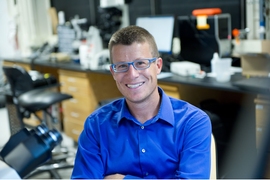On Sept. 19, Maria T. Zuber, MIT’s vice president for research, announced the membership of a community committee to plan and implement the MIT Climate Change Conversation. As Zuber noted, “The Committee should seek broad input from the Institute community on how the US and the world can most effectively address global climate change. The Conversation should explore pathways to effective climate change mitigation, including how the MIT community — through education, research and campus engagement — can constructively move the global and national agendas forward.”
Roman Stocker, an associate professor of civil and environmental engineering and chair of the Committee on the MIT Climate Change Conversation, spoke with MIT News about the committee’s charge, its progress to date, and its next steps.
Q. What does the Committee on the MIT Climate Change Conversation aim to achieve?
A. We aim to explore and assess the broad range of actions that MIT could take to make a significant positive contribution to address climate change. The global nature of this problem and the amount of debate and polarization that surround it are daunting, but the premise of the committee is that the complexity of the problem is uniquely suited for MIT, given our strong problem-solving ethos, and that a leading technical institution can have unique roles to play in responding to the climate crisis. Identifying and evaluating these potential roles is the purpose of the Conversation.
Importantly, the committee will only be the catalyst of the Conversation: Its main actor will be the MIT community! In other words, what we really aim to achieve is the engagement of the widest possible fraction of the MIT community in developing and debating bold ideas — MIT-style! — to help identify the pros and cons of different options. We believe that this approach will allow us, as a community, to identify a broad spectrum of action items; estimate the effectiveness of each action in addressing the problem; and thereby determine how our Institute can most effectively drive forward the national and global agendas on climate change.
We will consider actions at all levels: from new educational initiatives at MIT and via its edX megaphone, to new opportunities for research that capitalize and expand on MIT’s presence in the field, to improvements to campus infrastructure and operations aimed at reducing MIT’s own carbon footprint, to leveraging MIT’s visibility to drive more effective policy.
These are but examples, as we do not want to constrain the creativity of the MIT community. We will welcome any and all ideas through the multiple opportunities for input and feedback that we will construct. We look forward to this Conversation as a catalyst for original ideas, debate, and sound analysis.
Q. What has the committee done to date, since its membership was announced on Sept. 19?
A. Devising the right ingredients to make this MIT Conversation successful is what has kept us busy during this first month, and still is. Part of this effort consists of educating ourselves, within the committee, about the landscape of activities that already exist at MIT in the area of climate change, as some of these activities could represent important nucleation sites for bold ideas for action. At the same time, this knowledge will allow us to engage the MIT community in a more informed and meaningful way, through the Conversation activities we have begun to plan for the fall and spring.
Personally, this first month has also allowed me to appreciate the expertise we have on the committee, which I feel will be an invaluable asset in catalyzing this Conversation. The committee is composed of one faculty member per school, as well as representatives from the undergraduate and graduate student bodies, from the postdocs, and from the staff. Collectively, this group encompasses a wide range of expertise, covering both the science and the economics of climate change, as well as the on-campus infrastructural and operational aspects of a university planning for climate change.
The committee is unanimous in its feeling not only of the urgency of the problem — expressed with particular emphasis by the younger generations — but also of the unique opportunity that this Conversation represents for MIT to take on a visible leadership role in the solution of the problem.
Q. How can a member of MIT get engaged in this Conversation?
A. We will create multiple opportunities for engagement throughout the current academic year. In the next few weeks, we will launch both an Idea Bank and a survey. The Idea Bank intends to capture the expertise and creativity of the MIT community and to engage it in a campus-wide brainstorm about what actions MIT could take to address climate change. We will welcome input on the full spectrum of possible actions that MIT could take. We will particularly welcome bold, creative ideas, because we feel that the spectrum of options for action available to a leading technical institution has not been fully explored to date.
The survey is being designed to provide input for the committee in structuring the Conversation. With the survey, we aim to reach a wider fraction of the MIT community — hopefully, all of you! — and to understand how we can best support the community in this important Conversation.
We will carefully review the input we receive through both the Idea Bank and the survey, distill it into broad categories for potential action, and use it to inform the centerpiece of the Conversation, a series of high-profile forums to be held in the spring term. These forums will focus on the different action categories that MIT can consider investing in to further its role in addressing climate change, including education, research, financial actions, policy, campus operations — with specifics that will be refined based on community input.
The months ahead will represent a vibrant time to discuss climate-change actions at MIT. We invite everyone in the community to be part of this Conversation!









